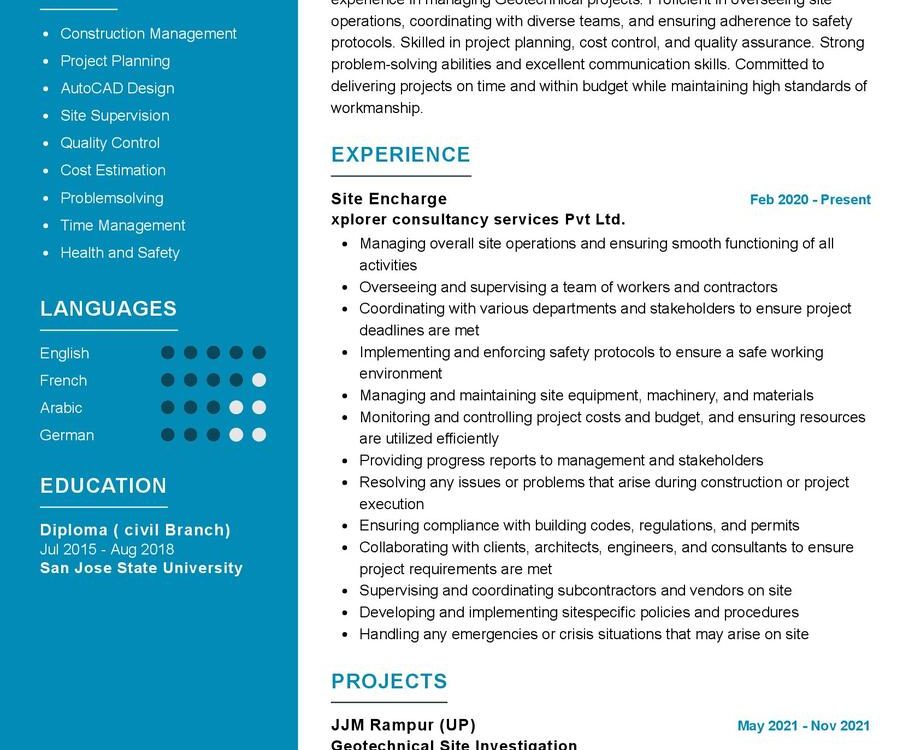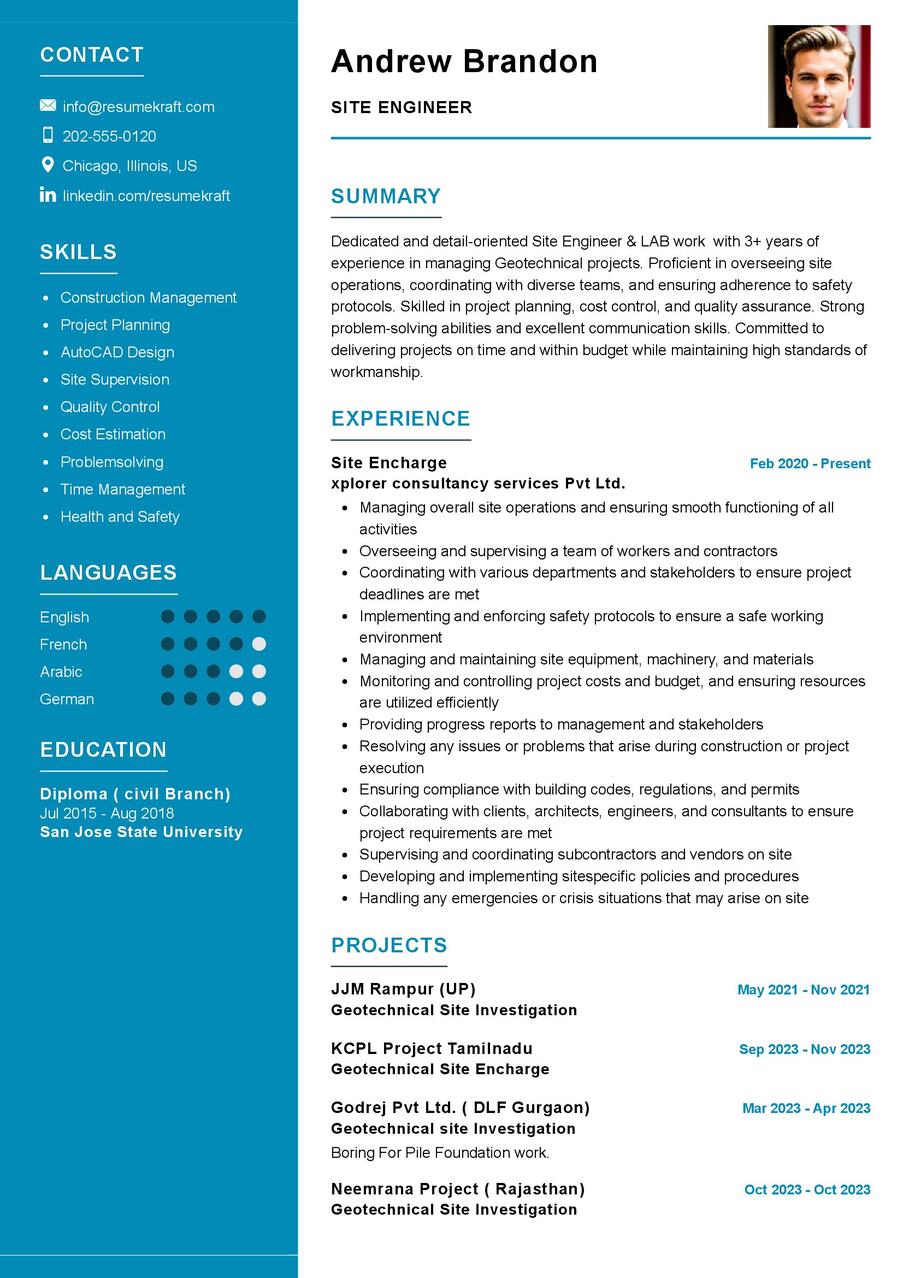Understanding the Role of a Site Engineer
In the realm of construction and civil engineering, the position of a Site Engineer holds significant importance. This role requires a unique blend of technical expertise and practical on-site knowledge, guiding construction projects towards successful completion. Let’s explore the multifaceted responsibilities and qualifications that define the role of a Site Engineer, a key player in the construction industry.
Site Engineer Job Requirements
Becoming a Site Engineer involves meeting specific requirements that set the stage for a successful career in the field. This journey demands a combination of education, hands-on experience, and the development of crucial skills. Here are the prerequisites for embracing the role of a Site Engineer:
- A Bachelor’s or Master’s degree in Civil Engineering or a related field, providing a solid foundation in the principles of construction and structural design.
- In-depth knowledge of construction materials, methods, and processes, gained through academic studies and practical experience.
- Proven experience in managing construction projects, showcasing a track record of successful on-site coordination and execution.
- Strong communication and interpersonal skills, essential for collaborating with construction teams, clients, and other stakeholders.
- Proficiency in construction management software and tools, enabling efficient project planning and monitoring.
- Problem-solving abilities and adaptability, crucial traits for addressing challenges that may arise during the construction process.
Additional certifications in construction management or related fields can enhance your profile and demonstrate your commitment to ongoing professional development.
Responsibilities of a Site Engineer
The role of a Site Engineer is a dynamic one, requiring a hands-on approach to various aspects of construction projects. Let’s unravel the core responsibilities that define this role and contribute to the successful execution of construction endeavors:
- Ensuring the accurate interpretation of architectural and engineering drawings, serving as a crucial link between design and on-site implementation.
- Overseeing day-to-day construction activities, including site inspections, quality control, and progress monitoring.
- Collaborating with architects, contractors, and subcontractors to ensure seamless communication and coordination throughout the project lifecycle.
- Implementing and enforcing safety protocols to create a secure working environment for all on-site personnel.
- Managing project budgets and timelines, making informed decisions to avoid delays and cost overruns.
- Addressing technical issues and providing solutions in real-time, demonstrating problem-solving skills under on-site pressures.
- Conducting regular meetings with the project team to ensure everyone is aligned with project goals and milestones.
Each responsibility showcases the Site Engineer’s pivotal role in turning architectural plans into tangible structures.
Site Engineer Resume Writing Tips
Crafting a compelling resume is essential for standing out in the competitive field of construction engineering. Here are some tips to create a Site Engineer resume that effectively communicates your skills and experiences:
- Highlight specific projects you have overseen, detailing your contributions and achievements for each.
- Emphasize your problem-solving skills by showcasing instances where you addressed challenges and ensured project success.
- Quantify your achievements with metrics, such as completing projects ahead of schedule or within budget.
- Include any additional certifications or specialized training that enhances your expertise in construction management.
- Tailor your resume for each application, aligning your skills and experiences with the specific job requirements.
Your resume is a reflection of your expertise, showcasing your ability to manage and execute construction projects effectively.
Site Engineer Resume Summary Examples
Your resume summary serves as the opening statement, providing a snapshot of your career and capabilities. Here are examples to inspire your Site Engineer resume summary:
- “Dedicated Site Engineer with a proven track record of overseeing complex construction projects, ensuring timely completion and adherence to quality standards.”
- “Detail-oriented Site Engineer with a passion for precision, adept at coordinating diverse teams to deliver successful construction outcomes.”
- “Experienced Site Engineer with expertise in project management, focused on optimizing processes and driving efficiency in construction projects.”
Your resume summary is the gateway to showcasing your value as a Site Engineer, capturing the essence of your skills and experience.
Create a Strong Experience Section for Your Site Engineer Resume
The experience section of your resume is where you delve into the details of your career journey. Here are examples to guide you in creating a compelling experience section:
- “Led a team in the construction of a commercial building, ensuring compliance with local regulations and completing the project three weeks ahead of schedule.”
- “Managed the renovation of an existing structure, implementing cost-saving measures that resulted in a 15% reduction in project expenses.”
- “Collaborated with architects and contractors on a high-profile residential project, contributing to the successful completion and positive client feedback.”
Your experience section narrates the story of your career, illustrating your contributions to each project and showcasing your impact as a Site Engineer.
Sample Education Section for Your Site Engineer Resume
Your educational background lays the foundation for your expertise as a Site Engineer. Here’s how you can present your educational milestones:
- Master of Science in Civil Engineering, XYZ University, equipped with advanced knowledge in structural design and construction management, 2018.
- Bachelor of Science in Civil Engineering, ABC University, providing a solid foundation in engineering principles and practices, 2014.
- Certified Construction Manager (CCM), demonstrating specialized training in construction project management, 2019.
Each educational qualification contributes to your proficiency as a Site Engineer, showcasing your commitment to academic and professional growth.
Site Engineer Skills for Your Resume
Your skill set is a toolbox equipped with essential elements for successful site engineering. Here are the crucial skills that a Site Engineer should possess:
Soft Skills:
- Leadership and team coordination, essential for guiding construction teams towards project success.
- Effective communication and interpersonal skills, facilitating seamless collaboration with diverse stakeholders.
- Problem-solving abilities, the capability to address challenges and ensure smooth project execution.
- Attention to detail, crucial for quality control and precision in construction activities.
- Adaptability and resilience, key traits for navigating the dynamic and unpredictable nature of construction projects.
Hard Skills:
- Expertise in construction management software, such as Procore or Buildertrend, enhancing project planning and monitoring.
- Proficiency in AutoCAD or other design software, aiding in accurate interpretation of architectural drawings.
- Knowledge of construction materials, methods, and processes, ensuring informed decision-making on-site.
- Understanding of safety regulations and protocols, prioritizing a secure working environment.
- Budget and timeline management, critical for project success and client satisfaction.
Each skill is a tool in your arsenal, contributing to your effectiveness as a Site Engineer in the construction industry.
Common Mistakes to Avoid When Writing a Site Engineer Resume
As you create your Site Engineer resume, avoid common pitfalls that can hinder your chances of securing your desired role. Here are mistakes to steer clear of:
- Using generic language that does not highlight your unique contributions and capabilities.
- Focusing solely on job duties rather than showcasing your achievements and impact on projects.
- Neglecting to include a cover letter, missing an opportunity to convey your passion for site engineering and construction.
- Overloading your resume with technical jargon, potentially alienating non-technical hiring managers.
- Failing to proofread, which can negatively impact your professional image and attention to detail.
Avoiding these mistakes ensures that your Site Engineer resume is polished, professional, and effectively communicates your qualifications.
Key Takeaways for Your Site Engineer Resume
As we conclude this comprehensive guide on crafting an impactful Site Engineer resume, remember these key takeaways:
- Highlight your project management skills, emphasizing your ability to lead construction projects to successful completion.
- Showcase your technical proficiency, detailing your expertise in construction management software, design tools, and on-site coordination.
- Provide specific examples of achievements, quantifying your impact on projects with metrics where possible.
- Include a section on continuous learning, showcasing any certifications or additional training that enhances your skills as a Site Engineer.
Finally, feel free to utilize resources like AI Resume Builder, Resume Design, Resume Samples, Resume Examples, Resume Skills, Resume Help, Resume Synonyms, and Job Responsibilities to create a standout application and prepare for the Site Engineer job interview.
Armed with these insights and tips, you are now ready to craft a resume that is a true reflection of your journey, your skills, and your aspirations. Best of luck!


